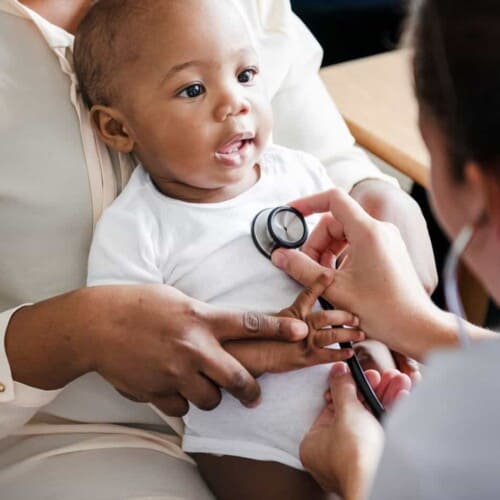4-8 Months: How Babies Learn and Develop

Babies 4-8 months old may explore objects with their mouth and by kicking, reaching, grasping, pulling, and letting go. They delight in discovering new skills!
Babies at this age can smile, laugh, coo, and reach out to engage their parents and other caregivers. They love to listen and respond to language by imitating the sounds and rhythms of what they hear.
How babies this age think, learn and interact
4-8 Months | Communication
Source: Colorado Early Learning & Development Guidelines, EarlyLearningCO.org
Loving relationships are the building blocks for healthy development.
Loving relationships make children feel safe, valued and encouraged. Relationships teach young children how to form friendships, understand and communicate their feelings, and overcome challenges.
Through our relationships with them as they grow, we teach children to develop compassion for others and a sense of right and wrong.
Starting at birth, the way that adults treat babies shapes what they learn and understand about themselves.
Every day when we care for and interact with our children we send them messages such as: You’re smart, you figured that out! You make me laugh and I enjoy being with you. You are loved.
These messages shape how a baby feels about herself ( self-esteem).
Tips to support social-emotional development at 4-8 months:
- Provide warm, responsive care. Give your baby the care that matches his needs. Once you get to know your baby, you will know what he likes and dislikes and what daily schedule works for him. Make sure to share this information with all of your baby’s caregivers.
- Help baby develop skills. Babies this age learn through relationships and by playing and exploring. Babies learn best when we give them a little help when then need it so they don’t become too frustrated. Share his joy in the things that interest him.
- Help babies feel safe and secure. When we cuddle, rock, sing, read and talk to our baby, we send her the message that she is special and loved. Even when babies cry, it’s important to be affectionate. This teaches children that they are loved for who they are. It helps them develop a sense of trust that will help them learn to soothe themselves as they grow.
- Make your culture part of the daily routine. Consistent routines also help babies feel safe and confident. A child’s culture is an important part of who they are. Find books and music at the library that relate to your culture and make these stories and songs part of your baby’s routine. Building connections to culture supports children’s self-esteem in healthy ways.
- Understand and manage separation anxiety. Usually around 8 or 9 months old, some babies may start to show separation anxiety and become upset at being away from you. This is because babies this age are starting to develop “object permanence,” the understanding that things and people still exist even when you can’t see them. Click here to learn more about how to ease your baby’s separation anxiety.
Source: Zero to Three, https://www.zerotothree.org/resources/series/developing-social-emotional-skills
Many children with developmental delays or behavior concerns are not identified as early as they could be. As a result, these children have to wait to get the help they need to succeed in social and educational settings (in school, at home, and in the community).
It’s important to identify children with developmental delays or behavior concerns as early as possible. Research shows that early intervention and treatment greatly improves healthy development.
| DEVELOPMENTAL MONITORING | DEVELOPMENTAL SCREENING | DEVELOPMENTAL EVALUATION |
| What is it?
Keeping your eyes out for developmental milestones Who does it? Parents, grandparents, other caregivers When does it happen? Birth through 5 years old Why is it important?
How? Get free, simple-to-use checklists here. |
What is it?
Looking for specific developmental milestones Who does it? Pediatrician, early childhood educator, other professional When does it happen? At 9, 18, 24 and 30 months – or whenever there is a concern Why is it important?
How? Professionals use a formal validated screening tool; learn more here. |
What is it?
Identifying and diagnosing developmental delays or conditions Who does it? Pediatrician, child psychologist or trained provider When does it happen? Whenever there is a concern Why is it important?
How? Professionals do a detailed examination using formal assessment tools, observation and conversations with parents and caregivers. |
Source: Centers for Disease Control and Prevention, https://www.cdc.gov/ncbddd/childdevelopment/screening.html
Learn more about developmental screenings and Early Intervention.
Babies 4-8 months old are developing a sense of trust and security with parents and caregivers. They enjoy interacting face-to-face and are becoming more alert and mobile. Babies this age are comforted when they know what to expect in their daily routine.
They are developing a greater social and emotional understanding and often show more interest in other children. They start to show an awareness of feelings and emotional expressions in others. They are learning how to get — and keep — an adult’s attention.
Try these tips to build a baby’s resiliency skills at 4-8 months:
- Respond to baby kindly and warmly every time you interact
- Make eye contact with baby during routines like feeding and diapering
- Talk and coo with baby, imitate his sounds and expressions
- Play peek-a-boo
- Talk, read and sing to baby every day
- Let baby watch other children; let older children talk, smile and laugh with baby
- Talk to baby about what he might be feeling based on behavior (crying, laughing, etc.)
- Stick to a routine schedule for feeding, sleeping and other activities so baby learns what to expect
Source: Colorado Project LAUNCH, www.EarlyChildhoodMentalHealthCO.org
More Resources
- Get tips to support learning at any age
- Learn more about how to support development during the early years.
- Find out how to support healthy social-emotional development at every age.
- Review a checklist of child development milestones at every age.









